Trash to Treasure
The Chu Chu project is turning rubbish collected from Yangon’s streets into recycled crafts and one of its objectives to encourage different thinking about waste.
Ko Cin Lamh Thang, also known as Tony, helps to run the trashiest shop in Dala. The roof is made of old tyres and the walls from bottles instead of bricks. Inside, the lampshades are cut and sewn from melted plastic bags, as are the “flowers” arranged around the room for decoration.
The shop’s shelves are lined with belts made from bicycle tyres and baskets woven from empty tea packets. One half of the space is a workshop where women work at sewing machines, fashioning purses from rubber inner-tubes and necklaces from the pull tabs of soft-drink cans.
“This is a design from Greece,” Tony said, displaying a large, colourful handbag. “This is my favourite, I think. These kinds of designs are easy and look so nice.”
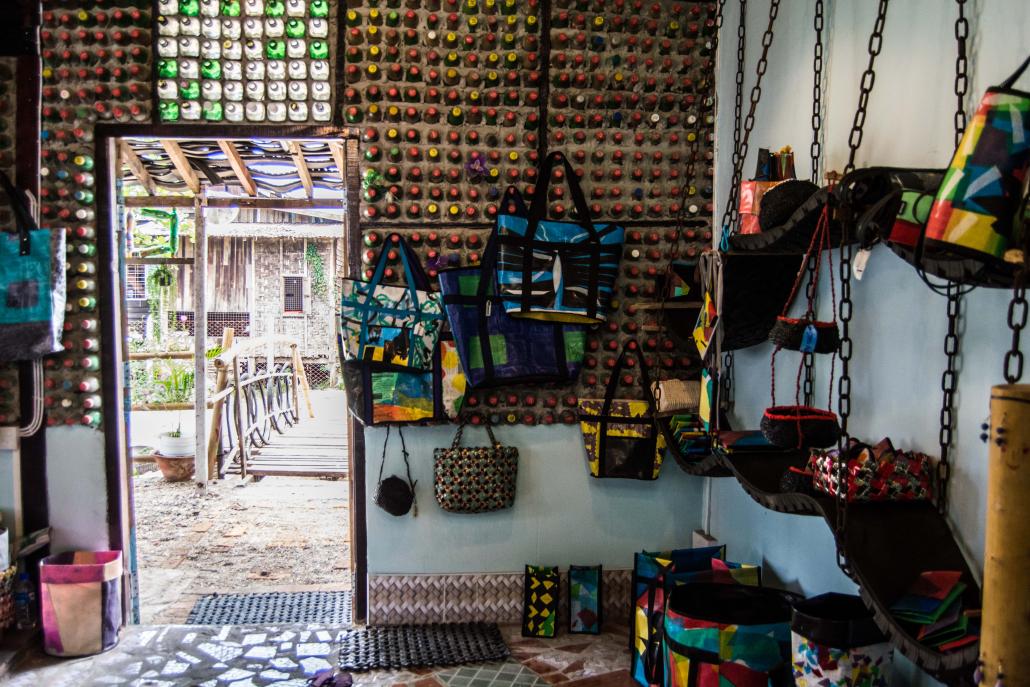
The combined shop, workshop and gallery is the culmination of the Chu Chu project, an endeavour by Italian NGO Cesvi to find treasure in the heaps of trash that litter Yangon’s alleys and gutters. The Chu Chu shop is across the Yangon River in one of the commercial capital’s poorest suburbs, yet Tony said there had been a steady flow of customers for its recycled products since it opened last month.
Chu Chu has spent the last two years designing products from reclaimed garbage, teaching families how to make them and giving them a place to sell their creations. Tony and his mother, Daw Cing Za Nuam, known as Wendy, who owns the land on which the shop was built, were among the first to be trained for the project.
“The idea was to set up the project where we turn the perspective on this waste issue; that’s why we were concerned with handicraft and up-cycling,” said Friedor Jeske, who started Chu Chu.
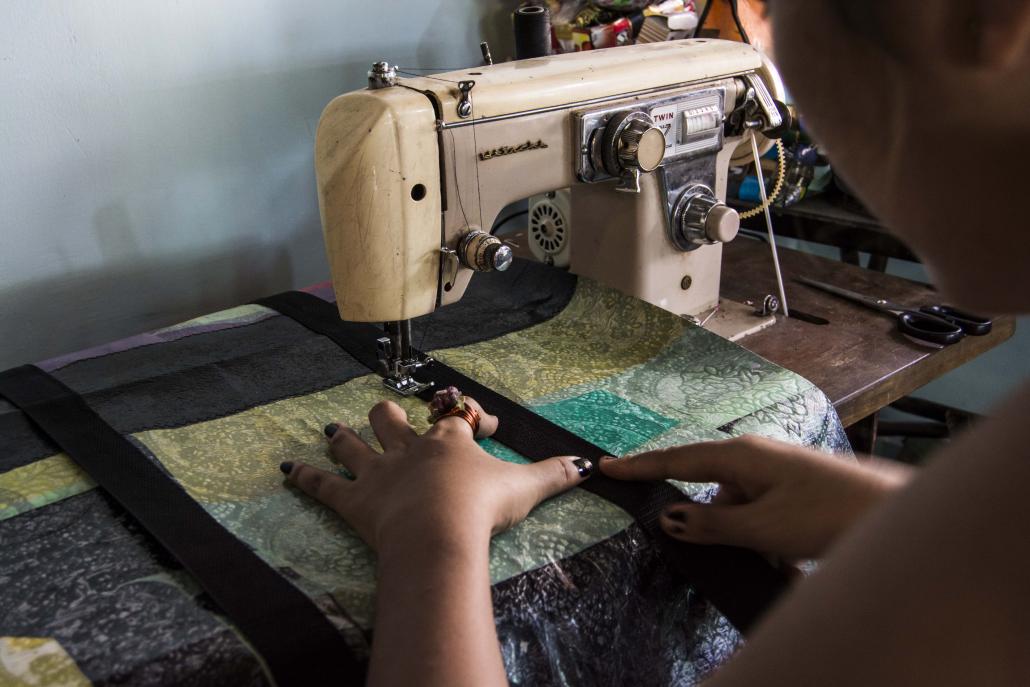
Mr Jeske, who works with Cesvi on sanitation and waste management projects, said developing marketable products from cans, bags and bottles was not about cleaning up Yangon’s streets, but wiping away the dirty image of waste in general.
Yangon has a robust recycling industry, but society tends to turn up its nose when it comes to rubbish and tosses out potentially valuable materials without a second thought, said Mr Jeske.
“[The crafts] will not push the people really on recycling. The waste is the problem. It is more like accepting the recycling sector more than enhancing them,” he said.
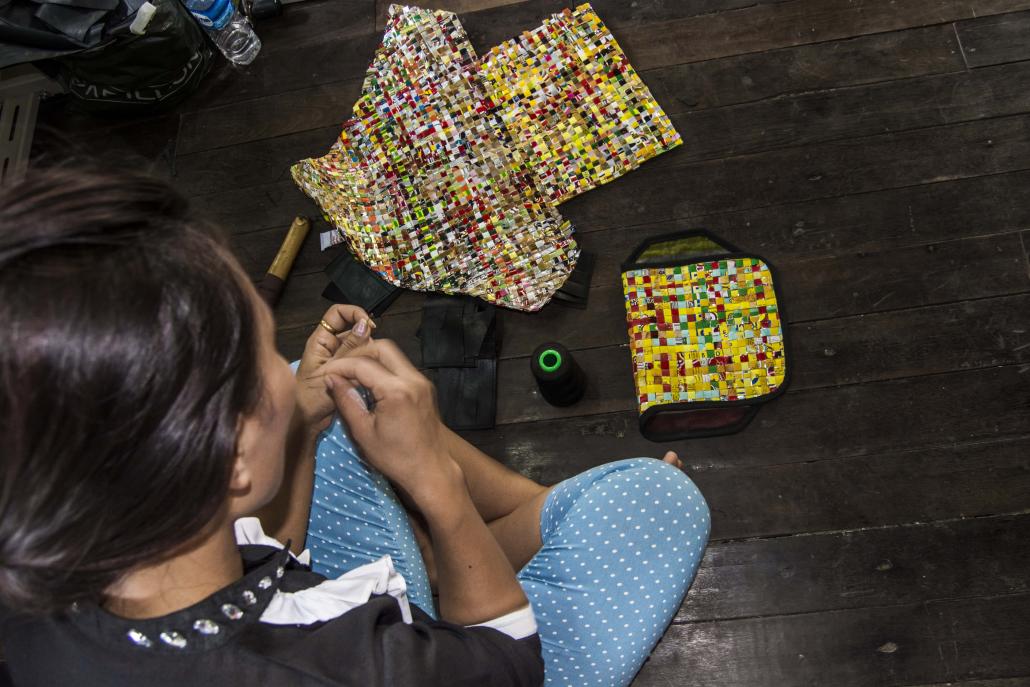
Sometimes Chu Chu’s makers buy materials from city waste stations. At other times they rummage through street waste beside the city’s garbage collectors, but instead of sending what they gather to the dump, they transform it into wallets, baskets, pencil bags, sleeves for wine bottles, even covers for Bibles with small cross designs ironed into the plastic.
Most of Chu Chu’s makers live in Dala, a community with resourcefulness in its very history. Tony claims Dala began as a settlement of outcasts and exiles from a former kingdom. Cut off from Yangon, the undeveloped southern suburb has spent the modern era chronically overlooked by politicians and city planners.
“Our neighbours don’t have a problem with us, but they are so interested in what we are doing. They say they want to make a movie about us,” said Daw Chingh Khan Dim, whose husband leads the Dala Bethel Church on the ground floor of their rented house.
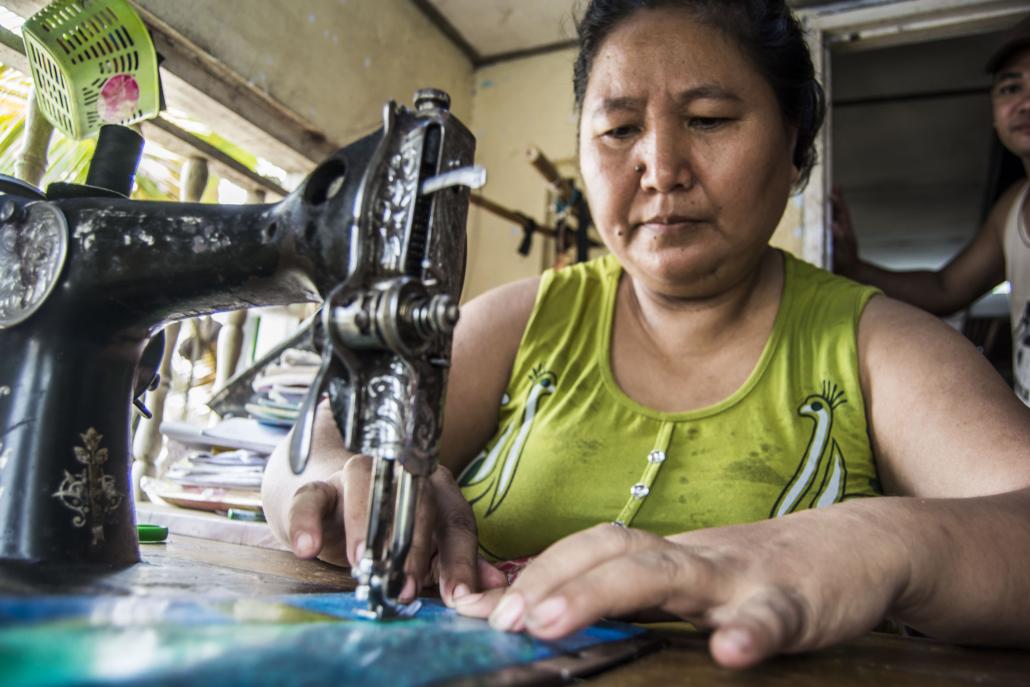
When I visited, Daw Chingh Khan Dim’s nephew was making belts from a pile of bicycle tyres on the front lawn. Inside, the small church sanctuary shared space with a large electric press, and the first floor was covered with sacks of raw plastic and half-finished purses and laundry bags.
“I like how we can make and sell whatever we want without a quota,” she said, referring to her former job as a seamstress. The family makes much more money selling recycled products, she said.
A total of five families (a “family” in Myanmar can be more than a dozen people) support themselves by making recycled products, and either work from home or at the Dala workshop.
Mr Jeske said it took six months to determine the best way to recycle the materials and Chu Chu provided an incentive to its first artisans by buying anything they made. Now the makers support themselves without any special help and meet each week to discuss improvements and new ideas. Wendy and Tony coordinate with organisations in rural communities throughout the country to find recycling solutions to practical problems.
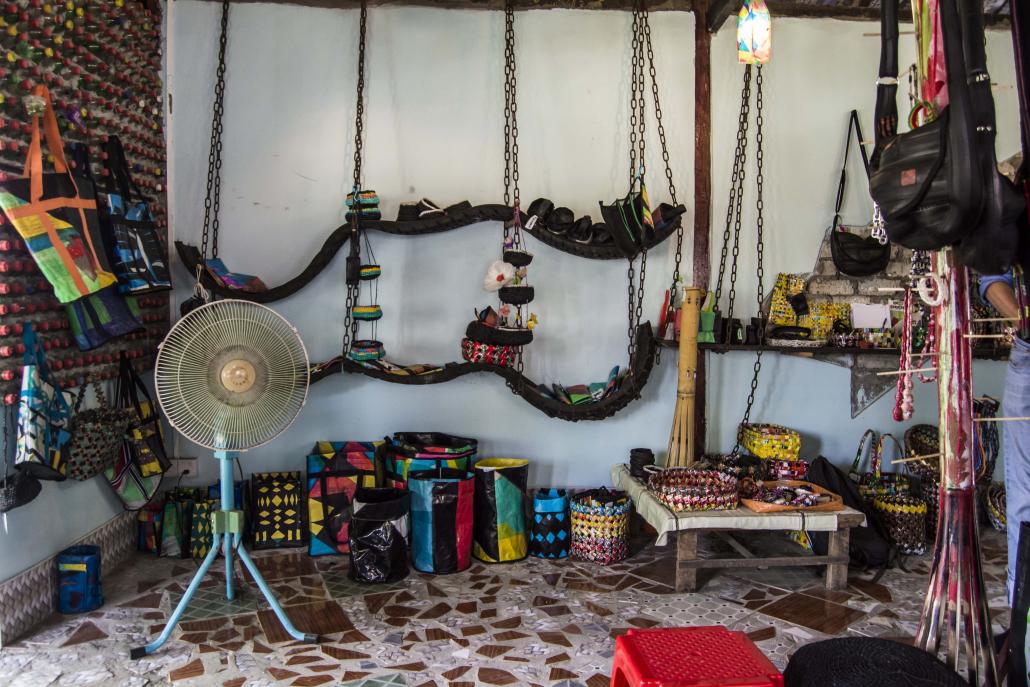
“They want to learn how this is done, what is the technique, what kind of design they can really do,” Mr Jeske said. A village in Chin State, for example, recently sought advice for making funerary flowers from old bags. “The ideas are quite different as well.”
Now that the business can support itself, Mr Jeske is stepping back to let the makers run Chu Chu. “Can they make money to continue, or can they not make money to continue?” he said. “Sustainability has to be there, otherwise the other things are for nothing.”
Tony and Wendy, on the other hand, are just getting started. In addition to their recycled house, Chu Chu products are also on sale at the Pomelo handicrafts shop on lower Thein Byu Road, and they have plans to expand in the coming months as they train more makers.
Like Mr Jeske, Tony doesn’t believe up-cycled goods will make a big difference to littering in Myanmar. He also does not expect houses made from bottles and tyres popping up in Yangon – the trash house was more of a statement than a solution. But it might encourage people to make the most of their resources, he said, and think twice about what they throw away.
ChuChu, Myanmar
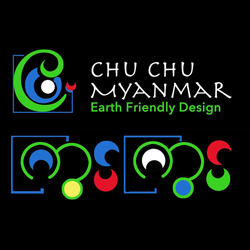
PROFILE
Their aim is to transform waste into beautiful new products. They started as a project funded by the Italian NGO Cesvi. Now they run a self-sustainable social enterprise, supporting 45 people.
Originally called KyutKyut, The company got its name from a Burmese word “Chu Chu”, which means plastic bag. “When you touch a plastic bag, the sound it makes is like ‘chu chu’. So that’s how we came up with the name,” Wendy explained. Founded 1 April 2014
They transform used umbrellas, plastic bags, paper, cement bags, tires, tubes and wrappers into beautiful, unique bags, gifts, containers and clothing accessories.
ChuChu provides training in product design using recycled materials, and can customize course content based on the individual or group. They offer professional consultant work regarding the set up of general solid waste management systems.
